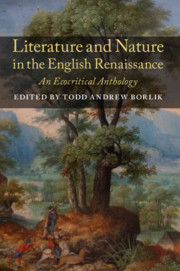Book contents
- Frontmatter
- Contents
- List of Illustrations
- Acknowledgements
- Editorial Principles: Towards the Ecocritical Editing of Renaissance Texts
- Introduction
- PART I Cosmologies
- PART II The Tangled Chain
- Hierarchy and the Human Animal
- Beasts
- Birds
- Fish
- Insects
- Plants
- Gems, Metals, Elements, Atoms
- PART III Time and Place
- PART IV Interactions
- PART V Environmental Problems in Early Modern England
- PART VI Disaster and Resilience in the Little Ice Age
- Appendix A Industrialization and Environmental Legislation in the Early Anthropocene: A Timeline
- Appendix B Further Reading: A Bibliography of Environmental Scholarship on the English Renaissance
Insects
from PART II - The Tangled Chain
Published online by Cambridge University Press: 05 June 2019
- Frontmatter
- Contents
- List of Illustrations
- Acknowledgements
- Editorial Principles: Towards the Ecocritical Editing of Renaissance Texts
- Introduction
- PART I Cosmologies
- PART II The Tangled Chain
- Hierarchy and the Human Animal
- Beasts
- Birds
- Fish
- Insects
- Plants
- Gems, Metals, Elements, Atoms
- PART III Time and Place
- PART IV Interactions
- PART V Environmental Problems in Early Modern England
- PART VI Disaster and Resilience in the Little Ice Age
- Appendix A Industrialization and Environmental Legislation in the Early Anthropocene: A Timeline
- Appendix B Further Reading: A Bibliography of Environmental Scholarship on the English Renaissance
Summary
One might assume that most early modern Europeans would have regarded the diminutive world of creepy-crawly things with contempt or disgust, if not fear and loathing. In sixteenth-century English the word “bug” signified something like bogeyman and would revealingly come to be used as a generic word for beetles. Yet many Elizabethans also took delight in the miniature, and the correspondence between the microcosm and macrocosm in neo-Platonic cosmology may have helped pique interest in these seemingly lowly or “lesser creatures.” The first great English entomologist, Thomas Penny (c. 1530–89), travelled all over England and Europe collecting specimens, and corresponded with many leading naturalists on the Continent. After his death, Penny's notes and sketches were compiled and given a literary polish by Thomas Moffett, a physician and author of a poem about silkworms (which features Pyramus and Thisbe and may have influenced Shakespeare's burlesque of that tale in A Midsummer Night's Dream). Although Moffett completed the book in 1589, his publishers balked at the cost of printing such a massive tome (which ran to 1,200 folio pages). The Theatre of Insects was finally published in 1634 in Latin and in English fourteen years later. While unfurling the medicinal use, moral significance, and alien beauty of insects, Moffett undercuts the anthropocentric prejudice that size is a true measure of importance.
Source: The Theatre of Insects (1658), Gggg1v–Gggg2v.
I shall add this concerning the dignity of this History of Insects (lest we should think God made them in vain, or we describe them): that in the universal world there is nothing more divine than these except Man. For however in show they are most abject and sordid, yet if we look more nicely ° into them, they will appear far otherwise than they promise on the bare outside.
“It oft times comes into my mind,” saith Gallisardus, ° “to think of our Italians, who commonly admire vehemently things notable for magnitude, or new and unusual, but things obvious in all places, and that are very small they despise. Yet if they look exactly to the matter it will be easy to observe that the divine force and power show themselves more effectually in mean things, and they are far more miraculous than those things the world with open mouth respects so much and admires.
- Type
- Chapter
- Information
- Literature and Nature in the English RenaissanceAn Ecocritical Anthology, pp. 167 - 176Publisher: Cambridge University PressPrint publication year: 2019



